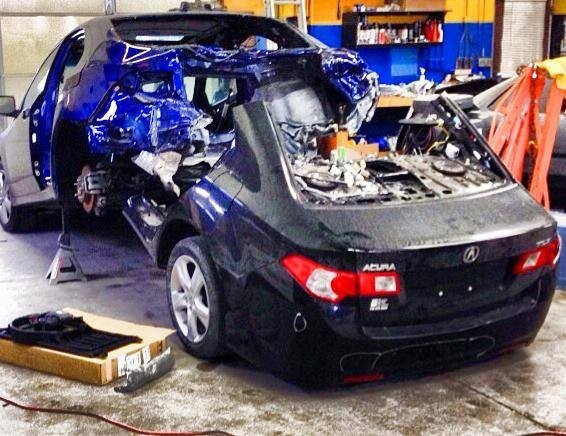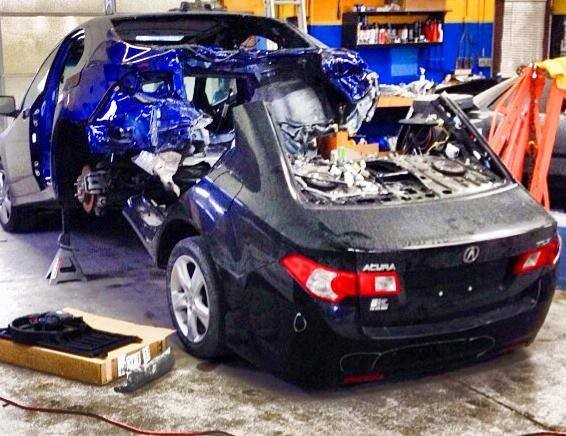Take a look at this photo below. In this image you are witnessing a body shop in the process of cutting the back half of a wrecked car off, and then weld in another back half from a wrecked car that was hit in the front.
If this were your vehicle, would you trust it?

There are quite a few generic articles on the Internet about how to pick an autobody shop. But do you know why it is so important to pick a great shop for your modern car? It could actually be a life or death decision, should a second accident ever happen to you in the same vehicle if your repairs were not done the way the manufacturer says to.
In this article I’m going to give you the definitive answer, one written by a person who spends a majority of their time in body shops all across the country. I’ve seen it all, the good ones, the bad ones, the trustworthy body shops, and the ones that I would never take my car to.
Why is it so important to pick a great auto body repair shop for my car or truck?
There is so much talk in the auto body repair world about who should make the decision in how to fix your car, and how much to charge for the repairs. This argument usually centers on the repair shop or the insurer, as these two are the ones doing the work and the ones who are paying for the repair bill. But there is a third source often left out of the conversation.
In my opinion, the manufacturer should be the one calling the shots in the repair, and there is talk that in the future, that will actually be the case.
The reason is that cars and trucks built today are the most sophisticated and complicated cars ever produced. They contain more “exotic” materials than ever before such as ultra high strength steel, magnesium, aluminum, even carbon fiber. The autobody repair shop of yesterday could pull just about any steel car back into shape. This is not the case today.
Cars have changed, and so have the repair methods, equipment, and auto body repair procedures. The problem is, not every shop has changed with the times. Many body shops have modernized their shops, but some are still stuck in the old ways of doing business. They may be a great shop to do business with, but your car might not be repaired properly, and worse, the old school body shop might not even know they fixed it the wrong way.
In the old days, you could pull cars back into shape with a frame machine, cut cars in half and weld them back together, and cut off old body panels and weld in new ones. A lot of this has changed.
With some of these newer materials, welding is replaced by bonding, aluminum cars cannot be repaired in the same room as steel cars, and some high strength steels become brittle and dangerous when heated.
The problem for body shops is how fast these procedures are changing. All of this information is a lot to keep up with and there are not very many clear channels for this information to get to the repairer. It is up to the shops and the technicians to research how to fix your particular type of car, and not every technician or shop owner is so vigilant.
Auto manufacturers can alter their repair procedures at any time.
If you have a very new model of car, one that has only been on the roads for a short amount of time, the manufacturers will actually work with some of the larger auto body repair chains to develop the repair plan for their cars on the fly.
That may come as a shock to you. The manufactures do some early crash testing before shipping cars to dealerships, but if yours is a brand new model and there have not been a lot of accidents with that model yet, the repair procedure might get altered later in the production run of that vehicle once there is more real world crash data information available. Manufacturers send out what they call TSB’s or technical service bulletins which have the most up to date repair information in them, or any changes to the repair plan, but you are putting a lot of faith in your repair that the shop has kept up to date with these, and applied the changes to your repair plan.
Again, this is why it is important to do your homework when researching shops. Does the shop you are about to take your car to actually take the time to educate themselves on your specific car before they begin to repair it? The answer to that question could mean life or death if you are ever in another accident.

